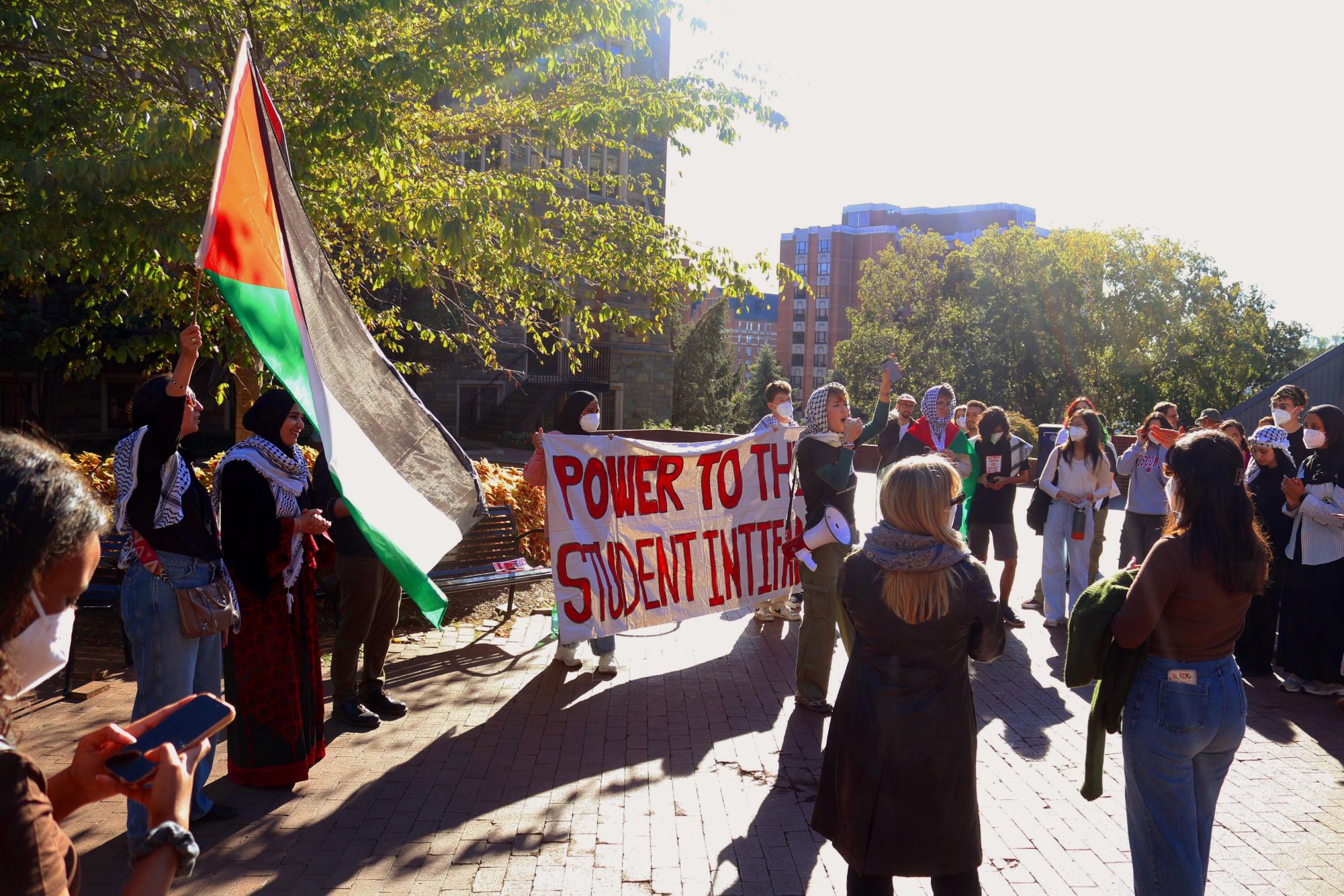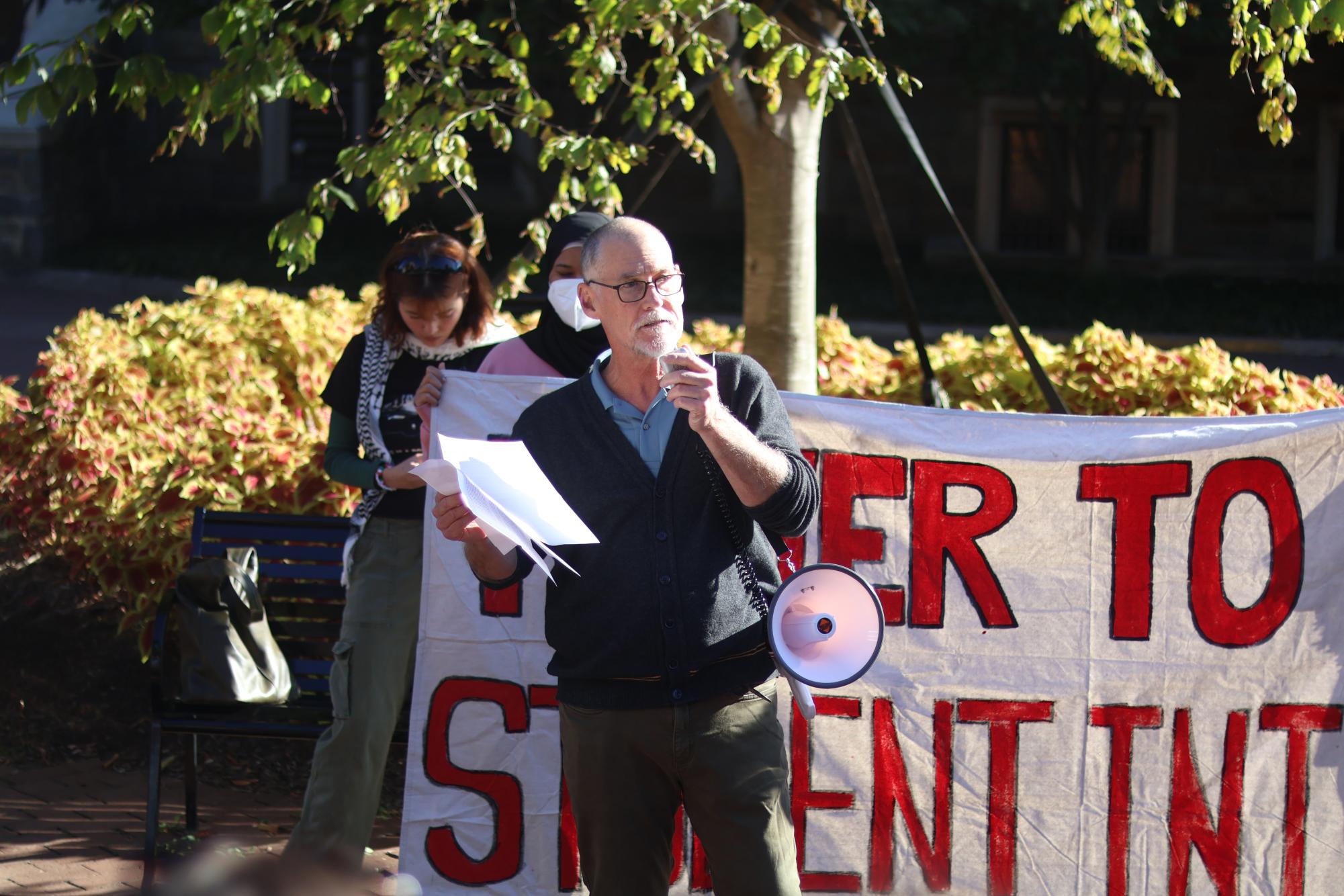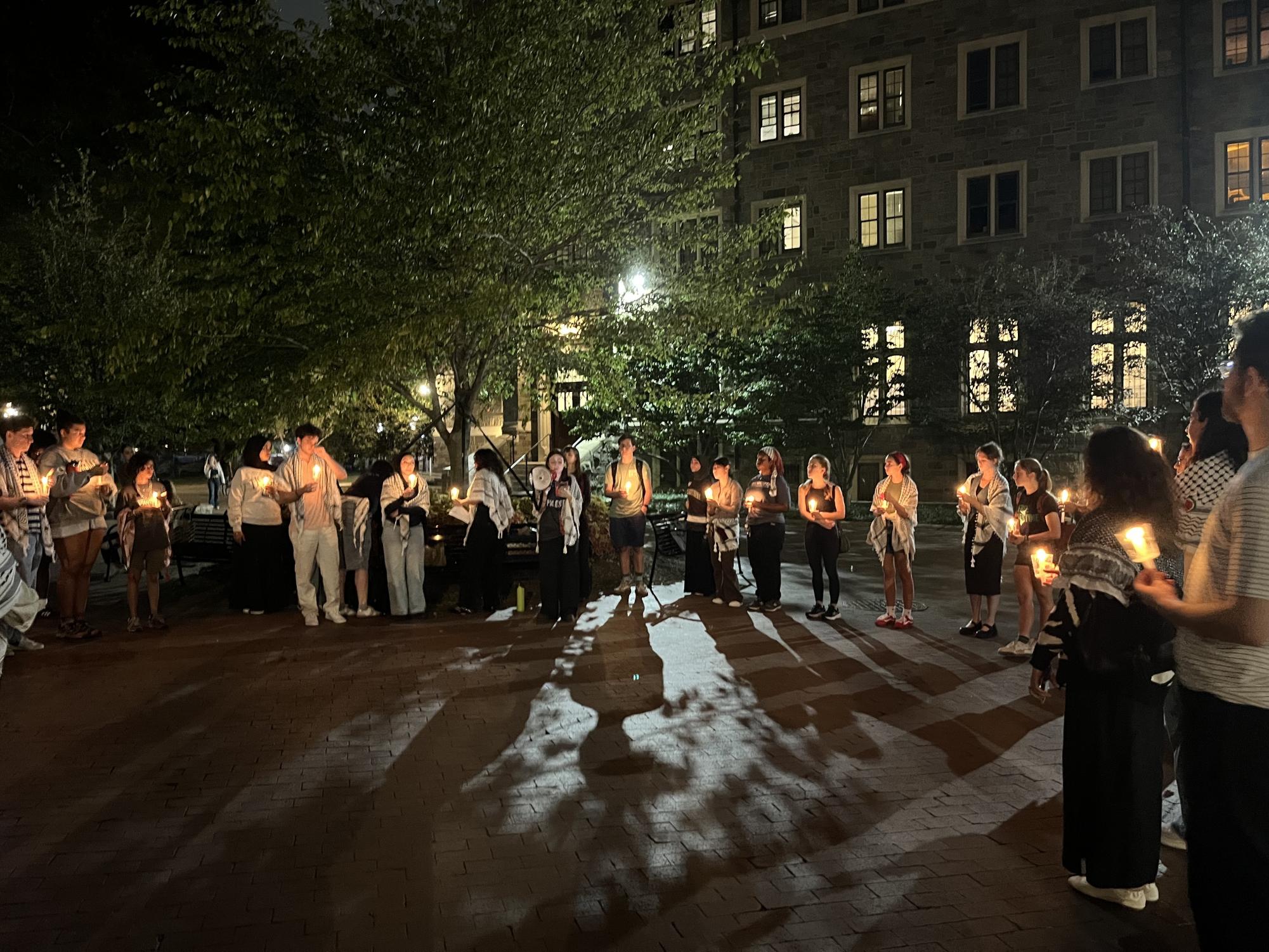Georgetown University community members mourned the deaths of tens of thousands of Palestinians and called for an end to the violence in Gaza during a “Week of Rage” marking two years since the start of the Israel-Hamas war amid an Oct. 8 ceasefire agreement between Israel and Hamas.
About 85 students and faculty members lit candles in Red Square on Oct. 7 while reading the names and testimonies of civilians who were killed in Gaza. Georgetown’s chapter of Students for Justice in Palestine (SJP) also led 60 people in a rally Oct. 9, demanding the university divest from companies associated with Israel and the Israeli military.

The demonstration and vigil were part of SJP’s second annual “Week of Rage,” which included a teach-in with Casa Latina, tabling and flyering, a book club event and a general body meeting.
Elliott Colla, a Faculty and Staff for Justice in Palestine (FSJP) member who spoke at the rally, said many Georgetown community members are not doing enough to advocate for Palestinians.
“History is watching us right now,” Colla told The Hoya. “Most people I know at Georgetown imagine that they would oppose the Holocaust and that they might even step in as citizens to stop it. And I have been struck by how many people just accept genocide in their daily life as they pursue their studies or their careers or their retirement packages or their promotions or whatever. It’s been a real lesson to realize this is how things like the Holocaust happen. It’s just deep, deep denial. Genocide denial runs deep.”
A growing body of scholars and advocates have accused Israel of genocide in its war against Hamas in Gaza, including the International Association of Genocide Scholars — made up of the world’s leading experts on genocide and crimes against humanity — and a United Nations commission. Israel has consistently denied claims of genocide, often characterizing such claims as antisemitic or anti-Israel. The International Court of Justice, which adjudicates genocide cases, has not yet made a ruling in a case brought against Israel by South Africa.
On Oct. 8, Israel and Hamas agreed to a ceasefire and hostage and prisoner exchange deal brokered by President Donald Trump, with multiple Arab heads of state endorsing the deal. The deal would return more than 40 remaining living and dead hostages to Israel, and permit at least 170,000 metric tons of medical and nutritional aid to enter Gaza.
An SJP media liaison at the rally said the organization’s demands and advocacy will persist amid the ceasefire.
“We’re still going to be pushing for the same goals of divestment that we always have been,” the liaison told The Hoya. “And it’s also worth noting that even though we are approaching a ceasefire, which is hopefully going to happen, our demands are always going to be the same. We can’t view just the genocide in Gaza in its own vacuum. The ethnic cleansing of Palestine has existed for literal decades beforehand, and there are still ongoing instances of repression in Palestine.”
Military and political conflict in the region has been ongoing since before the establishment of the Israeli state in 1948, which led to the displacement of hundreds of thousands of Palestinians.

Colla said the ceasefire agreement does not wholly address the extent of the destruction in Gaza.
“This is essentially an Israeli proposal,” Colla told The Hoya. “It is not a peace proposal by any means. It will not address any of the injustices, like the apartheid system, like military occupation, like the siege on Gaza. It addresses none of those. All it does is propose a ceasefire. We, of course, like our brothers and sisters in Gaza, we welcome a ceasefire, anything to stop this genocide, anything to bring in humanitarian aid. We, of course, welcome that, but we have no illusions that this is a solution, let alone a peace plan.”
Students and faculty also called for the university to abandon its plan to subcontract Georgetown University Transportation Shuttle (GUTS) drivers and sever ties with heads of military defense industry companies. Students specifically named Board of Directors members Adam Norwitt — the president and CEO of Amphenol, a technology defense contractor — and Joseph Amato, the president of investment firm Neuberger Berman Group LLC, which has invested $1.59 billion in military contracting.
Students at the Oct. 9 protest also criticized a change the university made to the free speech and expression policy, which permits university officials to require any individual on campus to remove face coverings to be identified.
“These policies use intentionally uncertain language,” a pamphlet distributed at the protest read. “Georgetown has changed its Code of Conduct multiple times since 2023, all quietly, without consulting students, in direct response to Palestine protests.”
A university spokesperson previously said that the university regularly updates its policy and implementation guidelines.
“Georgetown is committed to ensuring that all members of our community have a safe and welcoming place to learn and receive the support they need to do so,” the spokesperson wrote to The Hoya in July. “The vast majority of activism on campus is peaceful and takes place without incident. We all have a responsibility to work together to foster a living learning community that is free of bias and geared toward thoughtful, respectful dialogue.”
At the Oct. 7 vigil, students mourned the deaths of the estimated 67,000 Gazan civilians who were killed in the war, including children, doctors and Palestinian journalists.
Layth Malhis (GRD ’26), an Arabic studies student who read names at the vigil, said it was inspiring to see the community that gathered at the vigil.
“Despite the onslaught, we need to make community, and we need to cultivate the spaces where we’re able to honor those that are gone and also show one another that the fight against Israeli aggression should continue,” Malhis told The Hoya. “And I think the vigils and spaces that honor martyrs help us recenter ourselves and heal.”
Lukas Solomon (SFS ’26) said he found the vigil unifying and uplifting in a time of grief.
“I’m encouraged by the turnout here tonight,” Solomon told The Hoya. “I think it’s really telling that even two years later, there are people here from all sectors of campus. There are Arabs, there are Jews, there are non-Arabs, there are people from all different backgrounds coming together to grieve together and to say that this is unacceptable.”

Romy Abu-Fadel (SFS ’26), president of Georgetown’s Lebanese Student Association and a journalism student who spoke at the vigil, said she has been disappointed that primarily Western news networks have not been more precise when covering the destruction in Gaza.
“Watching NPR, the newspaper that I’ve adored for so long and respected and strived to work for, the way that they’re covering this is so deeply disappointing,” Abu-Fadel said. “I noticed the use of passive voice so frequently — which I mentioned in my speech. There seems to be a lack of agency.”
Oct. 7 marked the second anniversary of Hamas’s attack on Israel, which incited Israel’s retaliation and the sustained war. Hamas killed more than 1,200 Israelis and took 250 hostages in the attack, including from the Nova music festival in the Negev desert.
After the vigil ended, a survivor of the Nova festival attack, who was on campus for a speaking event hosted by the Georgetown Israel Alliance (GIA) and Students Supporting Israel (SSI), approached the students who remained at the vigil. The Hoya observed the survivor approaching the students who remained gathered in Red Square.
The survivor said “open your eyes, guys” as she walked out of Red Square accompanied by members of SSI and GIA.
Solomon said the event allowed community members to grapple with the international response to the crisis in Gaza.
“I have personally felt very disoriented all day today, just contending with the fact that it’s been two years of inaction from the international community, two years of continually being gaslit about the deaths and the genocide of our own people, two years of having to engage in repeated politics of appeal, to try and convince people to care about our people’s blood,” Solomon said.
“This space allowed us to come together in community and to grieve together and to remind us that there is a community we can rely on,” Solomon added.